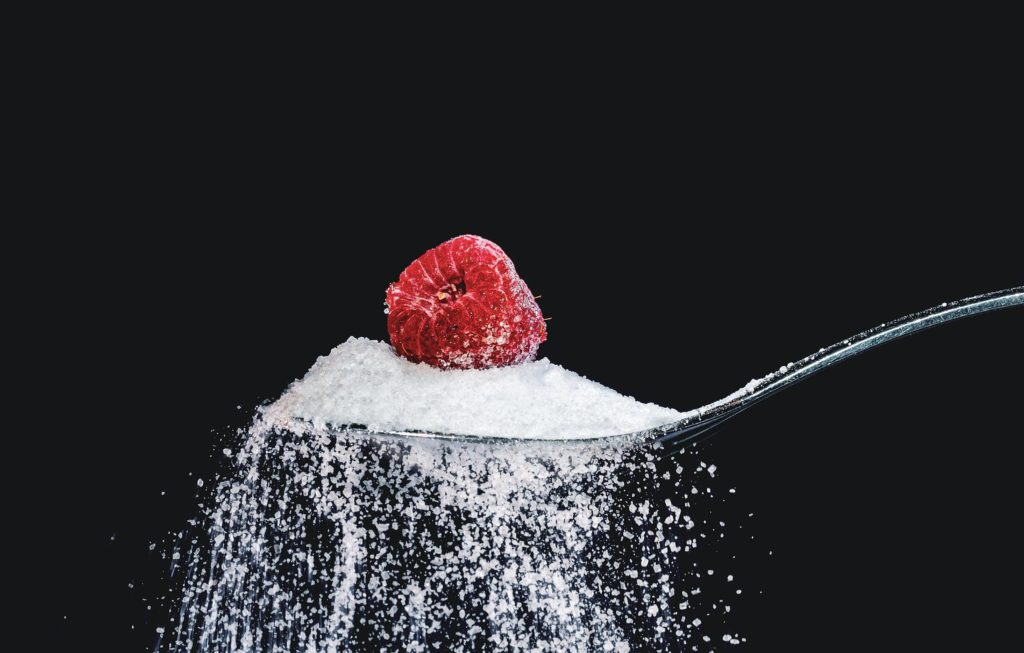Everything You Need to Know About Sugar Substitutes – What is safe and what to avoid
More people, for a variety of reasons, are reaching for a sugar substitute.
While this can be a great way to reduce sugar consumption, many of the options out there may do more harm than good in the long run.

Keep reading for a complete guide to the pros and cons to the most popular sugar substitutes!
What is a sugar substitute?
Sugar substitutes are either plant-based or chemicals that are used to sweeten the flavor of drinks, desserts, and other foods in place of sugar.
Some are referred to as artificial sweeteners, while others are called low-glycemic sweeteners.
A low or zero glycemic ingredient does not spike blood sugar.
Knowing which are healthy, which have side effects, and which to avoid is vital when shopping and making your own desserts and foods.
Sugar Substitutes that Should be Avoided (Artificial Sweeteners)
Artificial sweeteners are added to many diet foods and drinks in order to reduce calories, improve taste, and add sweetness.
They are man-made chemicals not found in nature, also called non-nutritive sweeteners.
However, many of these still lead to a rise in blood level, and may have other side effects such as headaches and migraines.
Aspartame
This is the most popular ingredient in many diet products, such as zero-calorie drinks. It is a chemical that is FDA approved under certain conditions.
However, there is a great danger linked to this ingredient.
Studies have found a connection to many illnesses such as cancer, cardiovascular disease, stroke, and dementia.
It can also affect mood negatively and cause headaches and migraines.
Additionally, it may lead to weight gain in the long run.
Sucralose
Sucralose an artificial sweetener is the main ingredient in Splenda.
This one comes from sugar, though it is altered to be low-calorie and 600 times sweeter than sugar.
Unfortunately, there are many cons to this sweetener.
Sucralose has been found to negatively affect gut bacteria, an essential part of overall wellbeing.
In many studies, this ingredient has not helped individuals lose weight, and may affect the blood sugar levels of individuals.
Studies have also shown that baking with it can lead to serious risk for cancer.
Saccharin
Saccharin is an artificial sweeter made in a lab.
It has no carbs or calories and is commonly used, as it is not digested by the body.
It is usually mixed with other artificial sweeteners, the main source of concern, and has a bitter taste.
Some studies that say it disrupts the balance of beneficial gut bacteria.
Acesulfame potassium
Also Called Acesulfame k, this is an artificial sweetener found in many drinks, shakes, baked goods, and candies, labeled as diet or sugar-free.
It is about 200 times sweeter than sugar but has many health concerns surrounding it.
There is a link between this ingredient and cancer, as well as thyroid damage.
Other studies found that it affects brain function negatively.
Safe Sugar Substitutes
The following sugar substitutes are completely safe in any quantity!
Stevia
Stevia comes from the leaves of a native South American herb, Stevia Rebaudiana.
It does not contain any calories or carbohydrates.
The purified extract of stevia leaves is the component that is approved for use in food and beverages.
Studies have shown that stevia can help lower blood sugar levels and lose weight.
Monk Fruit
Monk fruit is a small round fruit that grows in South Asia and is used to make low calorie sweeteners.
It was first used by Buddhist monks in the 13th century, hence the unusual name.
Monk fruit extract is 150 to 200 times sweeter than sugar.
The extract contains zero calories, zero carbohydrates, zero sodium, and zero fat, making it a popular sweetener alternative for manufacturers and consumers of low-calorie products.
Sweeteners made with monk fruit do not affect blood sugar levels, so they are a good option for people who watch their weight or are diabetic.
So far there is no scientific evidence to show that monk fruit has negative side effects. They are safe for children, pregnant women, and breastfeeding women.
It is available in liquid, granulated, and powder forms.
Sugar Substitutes Safe in Moderation
The sugar substitutes are safe as long as you use in moderation!
I used erythritol and bocha in everything and have never had any problems, so it varies fomr person to person.
Erythritol
Erythritol is a sugar alcohol, though the liver and body do not process it, and it does not contain alcohol.
It is an ingredient that occurs naturally in fruits, vegetables, and certain fermented foods.
It contains zero calories and zero carbohydrates. This sweet tasting poly-alcohol is characterized by not activating the pancreas to produce insulin.
Its appearance and texture are identical to cane sugar and in addition, it has a sweet and delicious flavor, though contains a slight cooling taste.
It is only partially absorbed and digested by the intestinal tract, which can cause gastrointestinal discomfort in some people when eaten in large quantities.
Allulose
Allulose is a monosaccharide (a simple sugar) found in whole fruits like raisins and dried figs.
Other foods that contain allulose include molasses, maple syrup, and brown sugar.
It is considered a rare sugar because it is not as abundant in nature as other sugars.
Allulose has about 90% fewer calories than table sugar and it doesn’t spike your blood sugar levels.
It is a substance that is not metabolized by the body, passing through our intestines without any interference or discomfort.
The only thing to be mindful of is that it is relatively new, hence more research should be done on its effects.
Xylitol
It is another type of sugar alcohol that is commonly found in products like gum, candy, and mints (the sugar-free variety).
It is as sweet as sugar, however, it does not raise blood sugar or insulin levels.
Some studies find that is is beneficial to teeth health, making it a common ingredient in toothpastes.
Xylitol has been associated with digestive problems when used in high doses, so you should reduce your consumption if you notice any adverse effects.
WARNING: xylitol is very toxic to your pets. I would not recommend it in a household with pets.
Bocha
Bocha sweet, the marketed name of this ingredient, is derived from the kabocha pumpkin, a superfood.
It is as sweet as sugar and has a near identical taste, with zero calories and zero spikes in blood sugar.
It has been used in Japan for many years and is recently making traction all over the world.
Like erythritol, it may cause discomfort if eaten in high amounts, though it is hard to reach that quantity.
The Takeaway
There are many sugar substitutes out there, though not all are created equal.
Knowing what to avoid and what is safe is the best way to raise health which reducing sugar consumption.
Find out all the hidden ways sugar is added to food products here and find out why limiting sugar can increase health here!





